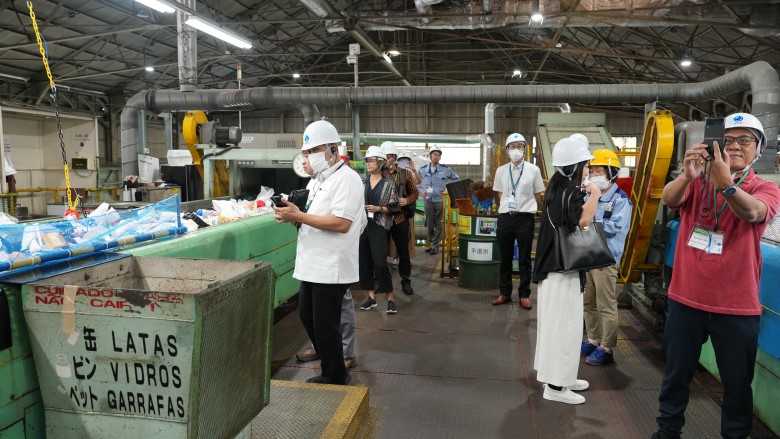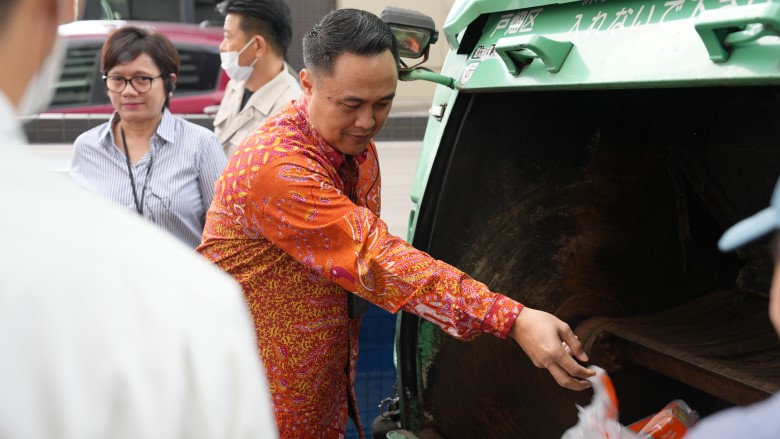September 25-29, 2023
Solid waste management is a priority sector for Indonesian cities.
Japan has been a frontrunner in the solid waste management sector for many decades. Careful planning, organization of the resources, engagement of citizens and private sector, coordination among stakeholders, futuristic vision, and focus on financial and environmentally sustainable solutions are some of the aspects that set Japanese cities apart from other countries.
With this knowledge, the Government of Indonesia, which is preparing the Indonesia Local Service Delivery Improvement Project (LSDP) with the World Bank, was keen on learning from Japanese experiences and know-how on waste management. The project supports upstream waste management including waste generation, transport, transfer, recycling and intermediate treatment. Specifically, the Government of Indonesia showed interest in learning about the engagement of citizens and private sector partners and waste segregation, collection, and recycling methodologies of Japanese cities.
Tokyo Development Learning Center (TDLC) in consultation with its City Partnership Program (CPP) partners organized an exposure mission for its Indonesian clients to learn from Yokohama and Kitakyushu’s waste management practices. TDLC welcomed to Japan the delegation of ten officials led by Kastorius Sinaga, Special Staff to the Minister, Ministry of Home Affairs (MOHA), along with the World Bank Task Team from September 25-29, 2023. The delegation comprised representatives from various ministries of Indonesia, including MOHA, Maritime and Investment Affairs, National Development Planning, and Environment and Forestry.
Japan adopts comprehensive approach towards waste management.
Japan has taken a decentralized approach towards its waste management. Municipalities autonomously make decisions to manage their waste under the overall aegis of national policies and regulations. An active strategy adopted in the 1990s, the strategy focuses on decoupling the waste generation from increasing GDP, and engagement and coordination with stakeholders, especially citizens and the private sector. By the 2000s, a reduction in waste generation and increasing recycling rates helped drive the nation towards sustainable waste management. While 80 percent of waste is still incinerated, a large chunk of the remaining waste is recycled, leaving only one percent going to landfills. A solid legal framework for waste management policy is the backbone of this approach. Having a strong vision, clear demarcation of roles, and enhanced capacities of stakeholders are other factors of success in moving from a linear to circular economy in the waste management sector.
Yokohama City – A case of waste recycling and treatment initiatives
Yokohama city, the largest municipality in Japan, with a population of 3.77 million covering an area of 438 sq. km, provides an interesting case study on metropolitan level waste management for many large cities in developing countries. Yokohama city incinerates most of its waste using four incineration plants spread across the metropolis.
Clients from Indonesia had the opportunity to visit Tsurumi Incineration Plant, which uses stoker type technology to burn the waste. The clients witnessed the process of how waste collected from households and businesses are brought to the plant for incineration, which in turn generates electricity. Using three stoker type incinerators of 400 tons/day of capacity each, this refuse treatment plant generates 22 megawatts (MW) of electricity every day. The Indonesian delegation was also able to witness the role of the private sector in waste management during their site visit to a Plastic Recycling Plant operated by J&T Recycling Corporation where they learned about the recycling of plastics for use in the construction of rainwater storage tanks. J&T Recycling Corporation is commissioned by the city to collect waste plastic discarded by households, turn it into a plastic bale, and transport it to government run recycling companies, thus providing integrated recycling business solutions through integrated logistics and waste recycling management.


